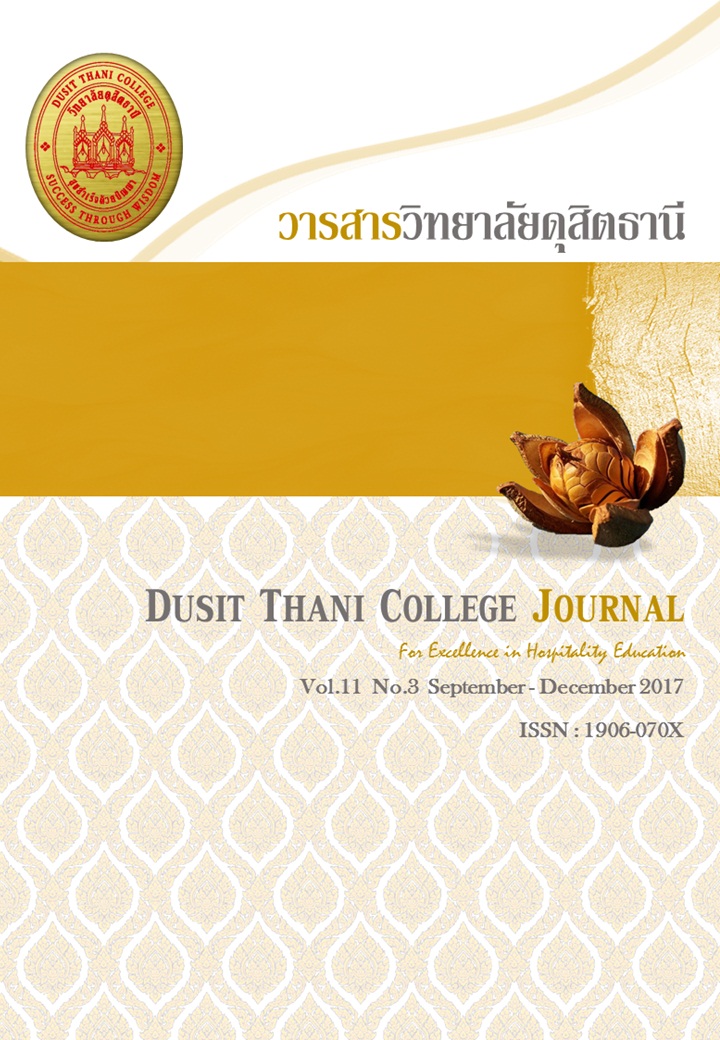Knowledge Management in Creative Tourism: A Case Study of The Amphawa Community in Samut Songkhram Province
Main Article Content
Abstract
The objectives of this qualitative study were to explore knowledge management processes and practices in creative tourism, and to analyze the potential for knowledge management in creative tourism of the Amphawa community, Samut Songkhram Province which is one of the communities in Thailand’s central plain livelihood cluster. The research process was divided into three phases: 1) Documentary research, 2) Focus group discussion, and 3) Descriptive analysis. The researchers employed the SECI knowledge spiral model developed by Nonaka and Takeuchi (1995) to provide a basis for data collection and data analysis. According to the focus group discussion among 6 participants including local public officials, community leaders, and entrepreneurs. It was found that the Amphawa community has varied bodies of knowledge including architecture, customs and traditions, local way of life, and career wisdom. The community’s knowledge management processes involve regulations, knowledge collection at the Amphawa-Chaipattananurak Conservation Project, informal discussions between community members, and knowledge documentation in research reports. These indicated that the Amphawa community’s knowledge management processes are based on the SECI model which consists of socialization, externalization, combination, and internalization. Moreover, Amphawa community has been able to effectively utilize the knowledge management process for developing creative tourism. Nevertheless, relevant agencies need to encourage community members to apply knowledge management practices to other issues in order to preserve the community’s local wisdom, thus leading to community strength and sustainability.
Article Details
Article Screening Policy
- All research and academic articles to be published must be considered and screened by three peer reviews in the relevant field / article.
- All articles, texts, illustrations and tables published in the journal are the personal opinions of the authors. Editors don't always have to agree. And no responsibility whatsoever is the sole responsibility of the author.
- The articles to be published must never be published. Where did you first publish? And not in the consideration of other journals If the audit found that there has been a duplicate publication It is the sole responsibility of the author.
- Any article that the reader sees as being plagiarized or impersonated without reference. Or mislead the work of the author Please let the journal editor know it will be your greatest blessing.
References
Choochan, Kanogwan. (2009). Knowledge Management of Cultural Resource by Community Leadership for Tourism: Ban Phamon Community, Doi Inthanon, Chiangmai Province, Thailand. Thesis paper for Degree of Master of Arts, Cultural Management, College of Innovation, Thammasat University.
Kaewsanga, Paimanee and Chamnongsri, Nisachol. (2012). Creative Tourism: A New Choice of Thai Tourism. Suranaree Journal of Science and Technology. 6(1), 91-109.
Nonaka, I. and Takeuchi, H. (1995). The Knowledge-Creating Company: How Japanese Companies Create the Dynamics of Innovation. New York, Oxford: Oxford University Press.
Office of the National Economics and Social Development Board. (2017). The 12th National Economics and Social Development Plan (2017-2021). Bangkok, The Prime Minister's Office.
Sindecharak, Teera and Sangsanit, Naligatipak. The Creative Tourism: Perception of tourists readiness of entrepreneur and possibility of creative tourism in Thailand. Retrieved August 24, 2016, from https://www.academia.edu/6073173/%E0%B8%9C%E0%B8%A8.%E0%B8%94%E0%B8%A3.%E0%B8%98%E0%B8%B5%E0%B8%A3_%E0%B8%B0_%E0%B8%AA%E0%B8%B4%E0%B8%99%E0%B9%80%E0%B8%94%E0%B8%8A%E0%B8%B2%E0%B8%A3%E0%B8%B1%E0%B8% 81%E0%B8%A91
Wanichritta, Thanyaporn. (2007). Knowledge management in community : a case study of ecotourism management by participation of the community, Samut Songkhram province. Thesis paper for Degree of Master of Education, Major Educational Technology, Sillapakorn University.
Wisudthiluck, Suddan et al. (2012). Creative Tourism as Viable Means to Sustainable Community. Thammasat Journal. 31(2), 76-86.
Wisudthiluck, Suddan et al. (2013). Creative Tourism. Bangkok: Designated Areas for Sustainable Tourism Administration (Public Organization).


